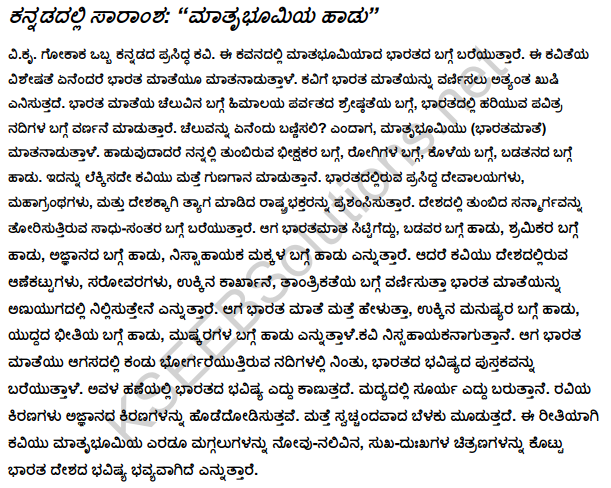10th English The Song of India Poem Summary in English and Kannada
The Song of India Poem Summary in English
The Poem was written by Vinayaka Krishna Gokak in the form of a dialogue between Mother India and the Poet. In this Poem The Poet wants to present glorious picture of the past and also wishes to paint India’s natural beauty
As Indians we can rightly be proud of our country’s natural beauty, Its Rich cultural heritage, its ancient wisdom, Its glorious freedom struggle and its industrial progress. As the same time we should not ignore the numerous ills affecting our motherland Like Poverty disease, environmental degradation, ignorance, illiteracy, unemployment, caste, and class conflicts and a hundred forms of exploitation. We should try to eradicate them as far as Possible.
![]()
As poet said Our mother India has to write the book of our destiny, cancelling all our sorrow. Tomorrow should be clear dawn. Our nightmare should fled in the night. We have to write our bright future… Sujalaam … Sufalaam … Malayaja Sheetalaam … Dream for bright future…
The Song of India Poem Summary in Kannada

The Song of India Poem About the Author
Vinayaka Krishna Gokak (9 August 1909 – 28 April 1992) was a major writer in the Kannada language and a scholar of English and Kapnada literatures. He was the fifth writer to be honoured with the Jnanpith Award in 1990 for Kannada language, for his epic Bharatha Sindhu Rashmi. Bharatha Sindhu Rashmi deals with the Vedic age and is perhaps the longest epic narrative in any language in the 20th Century. In 1961, Gokak was awarded the Padmashree from the Government of India for Dyava
![]()
Vinayaka Gokak studied literature at Karnatak College, Dharwad, Karnataka, India and was later awarded a First class honours by the University of Oxford. On his return from Oxford in 1938, he became the principal of Willingdon College, Sangli. He was principal of RajAram College, Kolhapur, Maharashtra from 1950-2. He was an ardent devotee of Sathya Sai Baba and served as the first Vice-Chancellor of Sri Sathya Sai Institute of Higher Learning at Puttaparthi, Anantapur District between 1981-1985. His novel Samarasave Jeevana is considered one of the typical works of Navodaya literature in Kannada.
V. K. Gokak was a prolific writer in both Kannada and English. He was deeply influenced by the Kannada poet D.R. Bendre who mentored him during his early forays into Kannada literature. Bendre is reputed to have said that were Gokak to allow his talent to bloom in Kannada, there was a bright future in wait for Gokak and Kannada literature.
His epic ‘Bharatha Sindhurashmi’, running into 35000 lines, is notably the longest epic written in this century, for which he received the Jnanpith Award and also honorary doctorates from Karnataka University and Pacific University, USA.
His novel ‘Samarasave Jeevana’ was translated by his daughter Yashodhara Bhat into English under the title The Agony and the Ecstasy’ and released to worldwide popularity.
In the 1980s, Karnataka was in the midst of an agitation which demanded the replacement of Sanskrit with Kannada as the medium of instruction in schools. V. K. Gokak also headed the ‘Gokak Committee’ which recommended declaring Kannada as the first language in schools in the state.
![]()
Gokak’s writing reflected his interest in religion, philosophy, education and cultures. His education abroad prompted him to write two sets of travelogues.
The Navodaya movement was at its peak and Gokak stayed true to his spirit- his poems showed nuances of Victorian poetry, oral traditions in Kannada storytelling and epics in Sanskrit and Kannada. V. K. Gokak wrote many collections of poetry under the pen name Vinayaka. These collections include ‘Samudra Geethegalu’,’Baaladeguladalli’,’Abhyudaya’, ’Dhyava Prithvi’ and ’Urnabha’.
Gokak’s anthology of poetry by Indian poets titled The Golden Treasury of Indo Anglican poetry was a treatise on poets like Sri Aurobindo, Sarojini Naidu and Toru Dutta, Nissim Ezekiel and Kamala Das. In the late 1960s he was deeply influenced by Sri Sathya Sai Baba of Puttaparthi and over the years, Gokak became the medium for translating the guru’s words into English and spreading it to the world. His book ‘The Advent of Sathya Sai’ explains the meaning of Sathya Sai Baba’s miracles, his work with the poor and his impact on the educational system.
![]()
The Song of India Poem Word Meanings
- wash your palm : (here) sweep along the
- Swarm : (here) crowd
- Sylvan retreats: a place of seclusion in deep woods
- A pitiful thing : (here) it refers to the poet himself
- Indexing : indicating
- Put on the page: to get recognition
- iron men : harsh men
- in their wake : who come right behind them
- class-war : conflict between the privileged and the underprivileged
- querulous : complaining
- heart-whole : complete
- unvapouring in the void : that which does not disappear into nothingness
- heaved : moved with power